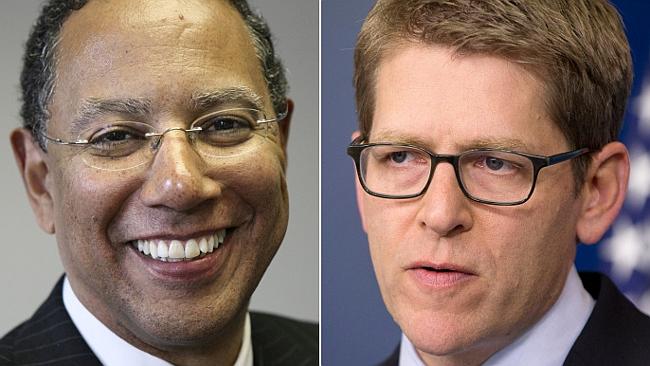Amazon spokesman, New York Times editor ratchet up feud
AMAZON is getting dirty in its fight with The New York Times over a front-page story which bashed the e-commerce giant.

THIS is getting ugly.
The New York Times and Amazon on Monday drew fresh blood in their bruising feud over an Aug. 16 story critical of the e-commerce giant — exchanging heated accusations and defences that are bound to leave both sides scarred.
Jay Carney, the former White House spokesman who is now Amazon’s No. 1 spokesman, launched the first salvo in the latest battle when he called into question the journalism in the Times’ Page 1 story that bashed the corporate culture at Amazon.
The Times deliberately distorted the workplace atmosphere at Amazon, Carney claims.
Amazon was never asked to “check or comment on any of the dozen or so negative anecdotes from named sources that formed the narrative backbone of the story,” Carney said in a lengthy public post on the blog site Medium.
The blog post, titled ‘What the New York Times Didn’t Tell You’, drew a quick response from Times Executive Editor Dean Baquet. The head of the paper’s editorial operation defended the reporters, Jodi Kantor and David Streitfeld, and said they interviewed more than 100 people for the story.
The most powerful quote was from an ex-employee of Jeff Bezos’ sprawling retail business, Bo Olson, who was quoted as saying, “Nearly every person I worked with, I saw cry at their desk.”
But Olson was not a good person to base a story on because his “brief tenure ended after an investigation revealed he had attempted to defraud vendors and conceal it by falsifying business records,” Carney wrote in his blog post. “When confronted with the evidence, he admitted it and resigned immediately.”
Baquet fired back: “If we had known [Olson’s] status was contested we would have said so.” But he said Olson on Monday told them he was “never confronted with allegations of personally fraudulent conduct or falsifying records, nor did he admit to that.”
Carney insisted that the Times’ journalists had an agenda and “never found the time or inclination to ask us about the credibility of a named source whose vivid quote would serve as the lynchpin for the entire piece.”
In another instance, the reporters said one employee spent four days without sleep working on a report. Carney countered that it was not pressure from Amazon that made her do so, but a choice she made and that personal crisis contributed to her sleeplessness, which was not mentioned by the Times.
Said Carney, “In any story, there are matters of opinion and there are issues of fact. And context is critical. Journalism 101 instructs that facts should be checked and sources should be vetted.”
Weeks ago, before the blog post was published, the Times was asked to “correct the record,” Carney wrote, but “[t]hey haven’t, which is why we decided to write about it ourselves.”
Times reporters also misled Amazon on the nature of the story as it was unfolding, Carney claims.
Baquet countered on Monday, “I should point out that you said to me that you always assumed this was going to be a tough story, so it is hard to accept that Amazon was expecting otherwise.”
This article originally appeared on New York Post and was reproduced with permission.



